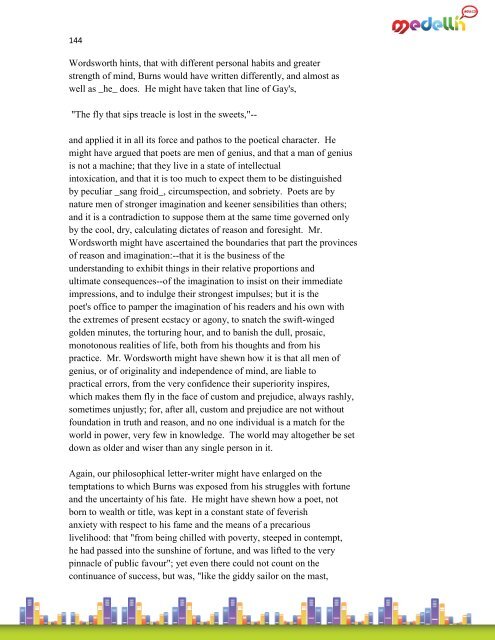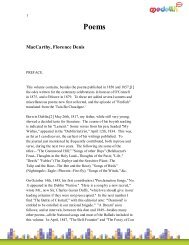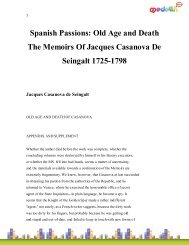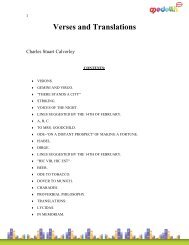Lectures On The English Poets William Hazlitt
Lectures On The English Poets William Hazlitt
Lectures On The English Poets William Hazlitt
You also want an ePaper? Increase the reach of your titles
YUMPU automatically turns print PDFs into web optimized ePapers that Google loves.
144<br />
Wordsworth hints, that with different personal habits and greater<br />
strength of mind, Burns would have written differently, and almost as<br />
well as _he_ does. He might have taken that line of Gay's,<br />
"<strong>The</strong> fly that sips treacle is lost in the sweets,"--<br />
and applied it in all its force and pathos to the poetical character. He<br />
might have argued that poets are men of genius, and that a man of genius<br />
is not a machine; that they live in a state of intellectual<br />
intoxication, and that it is too much to expect them to be distinguished<br />
by peculiar _sang froid_, circumspection, and sobriety. <strong>Poets</strong> are by<br />
nature men of stronger imagination and keener sensibilities than others;<br />
and it is a contradiction to suppose them at the same time governed only<br />
by the cool, dry, calculating dictates of reason and foresight. Mr.<br />
Wordsworth might have ascertained the boundaries that part the provinces<br />
of reason and imagination:--that it is the business of the<br />
understanding to exhibit things in their relative proportions and<br />
ultimate consequences--of the imagination to insist on their immediate<br />
impressions, and to indulge their strongest impulses; but it is the<br />
poet's office to pamper the imagination of his readers and his own with<br />
the extremes of present ecstacy or agony, to snatch the swift-winged<br />
golden minutes, the torturing hour, and to banish the dull, prosaic,<br />
monotonous realities of life, both from his thoughts and from his<br />
practice. Mr. Wordsworth might have shewn how it is that all men of<br />
genius, or of originality and independence of mind, are liable to<br />
practical errors, from the very confidence their superiority inspires,<br />
which makes them fly in the face of custom and prejudice, always rashly,<br />
sometimes unjustly; for, after all, custom and prejudice are not without<br />
foundation in truth and reason, and no one individual is a match for the<br />
world in power, very few in knowledge. <strong>The</strong> world may altogether be set<br />
down as older and wiser than any single person in it.<br />
Again, our philosophical letter-writer might have enlarged on the<br />
temptations to which Burns was exposed from his struggles with fortune<br />
and the uncertainty of his fate. He might have shewn how a poet, not<br />
born to wealth or title, was kept in a constant state of feverish<br />
anxiety with respect to his fame and the means of a precarious<br />
livelihood: that "from being chilled with poverty, steeped in contempt,<br />
he had passed into the sunshine of fortune, and was lifted to the very<br />
pinnacle of public favour"; yet even there could not count on the<br />
continuance of success, but was, "like the giddy sailor on the mast,

















